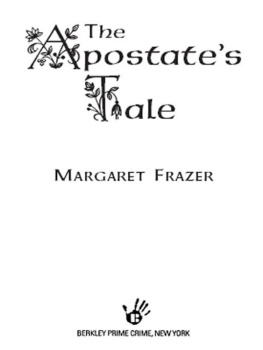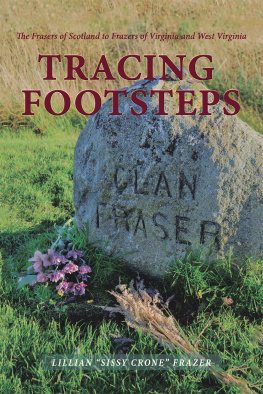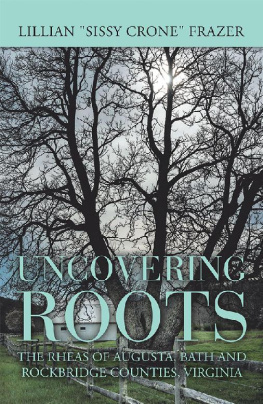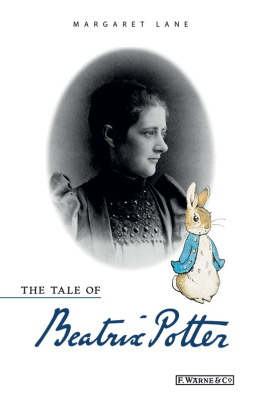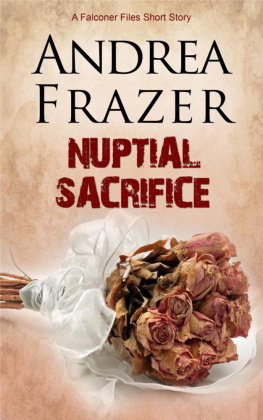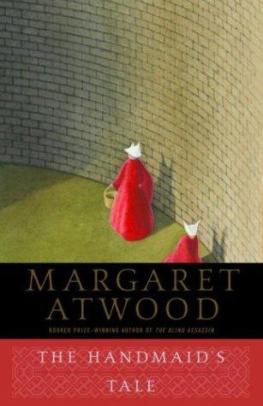Margaret Frazer - The Apostates Tale
Here you can read online Margaret Frazer - The Apostates Tale full text of the book (entire story) in english for free. Download pdf and epub, get meaning, cover and reviews about this ebook. publisher: Berkeley, genre: Prose. Description of the work, (preface) as well as reviews are available. Best literature library LitArk.com created for fans of good reading and offers a wide selection of genres:
Romance novel
Science fiction
Adventure
Detective
Science
History
Home and family
Prose
Art
Politics
Computer
Non-fiction
Religion
Business
Children
Humor
Choose a favorite category and find really read worthwhile books. Enjoy immersion in the world of imagination, feel the emotions of the characters or learn something new for yourself, make an fascinating discovery.
- Book:The Apostates Tale
- Author:
- Publisher:Berkeley
- Genre:
- Rating:4 / 5
- Favourites:Add to favourites
- Your mark:
- 80
- 1
- 2
- 3
- 4
- 5
The Apostates Tale: summary, description and annotation
We offer to read an annotation, description, summary or preface (depends on what the author of the book "The Apostates Tale" wrote himself). If you haven't found the necessary information about the book — write in the comments, we will try to find it.
The Apostates Tale — read online for free the complete book (whole text) full work
Below is the text of the book, divided by pages. System saving the place of the last page read, allows you to conveniently read the book "The Apostates Tale" online for free, without having to search again every time where you left off. Put a bookmark, and you can go to the page where you finished reading at any time.
Font size:
Interval:
Bookmark:
THE NOVICES TALE
THE SERVANTS TALE
THE OUTLAWS TALE
THE BISHOPS TALE
THE BOYS TALE
THE MURDERERS TALE
THE PRIORESS TALE
THE MAIDENS TALE
THE REEVES TALE
THE SQUIRES TALE
THE CLERKS TALE
THE BASTARDS TALE
THE HUNTERS TALE
THE WIDOWS TALE
THE SEMPSTERS TALE
THE TRAITORS TALE
THE APOSTATES TALE
Also by Margaret Frazer
A PLAY OF ISAAC
A PLAY OF DUX MORAUD
A PLAY OF KNAVES
A PLAY OF LORDS
O ne problem in writing books set in medieval England is that people know what the Middle Ages were like, when all too often what they know are the Victorian clichs that were too often based more on nineteenth century narrow-minded arrogance than on facts. So readers find elements and attitudes they think are modern in these stories but are not. Take, for example, the idea of disease being contagiousa modern notion the primitives of medieval England could not have had? To the contrary, the words contagion and contagious date from at least the 1300s, according to the Oxford English Dictionary , and are probably older. Also infect and infection. There was even speculation that disease was caused by some manner of animals so small they could not be seen, but their existence was deduced from the observed evidence. A theory of germs before they were ever seen under a microscope.
Likewise, the words detect and investigate were in use in medieval England, putting paid to the idea sometimes expressed that to have a detective at all in medieval times is inaccurate because nobody understood about detecting then. Admittedly, the word detective is centuries later, but there are books extent from at least the 1200s detailing how to go about investigating a crime.
They were not fools in the Middle Ages. They were as varied a people as we are nowsome wiser, some more foolish; some more capable, some less; some skilled one way, some skilled anotherall living a complex and multi-layered life, not sitting about in squalid ignorance waiting in dull-minded violence for the Renaissance to enlighten the world (which it did not; it merely threw a different light).
In more cheersome vein, there are young Edwards boules, which could not be marbles, although they so obviously are. Games with small balls made out of various materials go back into antiquity as well as forward to our own time, but only after machinery was developed in the 1600s that could readily shape stone into small balls did these small balls become known as marbles.
The lack of politics in this story may have been noted. There was a major confrontation earlier in this year between the Duke of York and the Kings party, but it did not come to battle, and so little more than rumor and slight report were likely to have reached northern Oxfordshire and then would be quickly lost under the more immediate interests of peoples lives. An advantage, perhaps, to not having twenty-four-hours-a-day streaming news: Without it, people have chance to go more deeply into their own lives, rather than distracting themselves by skimming along the surface of myriad other peoples.
Of course that very narrowness is what would drive someone like Sister Cecely out of a nunnery, while at the same time being what someone like Dame Frevisse values. Two different desires of how to live a life, and Sister Cecelys tragedy coming because she was forced into the wrong one for her and she could not bear it.
A s they rode under the gateways broad arch, the horses hoofs were suddenly loud on the cobbles and the rain briefly ceased to batter at Cecelys cloaked shoulders and head. Her dearest wish had been never to see this place any more, never to be here ever again, but now no matter that the rain-grayed walls under the dismal, drizzling sky looked even more a grim prisons than she remembered them, she was as thankful to be finally here as she had ever been for anything.
Ahead of her, Dame Perpetua said at the backs of the two men leading them, Well ride straight on to the cloister door, not to the guesthall at all, and one of the men answered, Yes, my lady.
Cecely felt as if she had been riding on since forever, and if the cloister door was the only way out of this cursed rain and to a chance of dry clothing, a fire, and a warm drink, then she was ready to be even there, despite of everything and no matter what.
Tented under her cloak in front of her in the saddle, Neddie stirred, making a small sound of weariness and probably complaint. Cecely said down at him, Almost there, little love. Almost done. Dont start whimpering now. Youre not a puppy, and prodded him a little to be sure he heard her.
The horses plodded out of the gateways far side and into the rain again and the nunnerys guesthall yard with its close surround of buildings and the church looming over all, its tall front blurred beyond the rain but not blurred enough. Cecely could feel what lay waiting for her beyond that front, and her shudder had nothing to do with the days rain-chill. But there was no going back now. The men had already drawn rein at the cloister door on the yards far side and were quickly dismounting, one of them going to knock loudly at the cloister door, the other coming to help Dame Perpetua from her horse, while their fellow, who had been bringing up the rear, dismounted, too, and went past Cecely to help the other nun, the one who had not been here in Cecelys time.
Cecely waited. Of course, being the nuns servants, the men would see to both of them first, and then probably to the other woman, the older one who anyone could see was not well, but the nuns might haveshould haveordered them to see to Neddie first, he was just a little boy. Then she could have got down, too. Why wasnt someone answering the door?
As if to her thought, the cloister door opened, and now both nuns, awkward in their long skirts and rain-heavy cloaks, were on either side of the older woman, helping her toward the door, while two of the men were gathering the horses reins to lead them away, and only finally was the third man coming toward her. Impatiently, pulling her cloak away from Neddie, she said, Here we go, lamb. Well be inside in just a moment. Let the man lift you down.
Neddie, poor little thing, leaned sideways into the mans hands and let himself be dragged from the saddle. Cecely expected the man to set him down and turn to help her then, but instead he carried Neddie away toward the cloister door, leaving her, stiff with cold and riding though she wassurely just as cold and stiff as the other women had been, if not worseto get herself to the ground.
Thinking bitterly that everything here was just as stupid as it had ever been, she dragged her rain-soaked skirts, sodden cloak, and weary legs clear of the saddle and eased herself to the ground. One of the men made to take her horses reins but she snapped, At least give me my saddle bags. Do that much for me.
As grudging to help her as everyone else was, he untied the bags without a word, lifted them off, and handed them to her. She did not bother to thank him, just stood clutching her bags, and when he had taken her horse and followed the other men and horses away, she went on standing there, suddenly unwilling to go where she had to go next. Behind her, everything her life had been was gone. Ahead of her the black emptiness of the open cloister doorway waited for her. The women and even Neddie were already disappeared into that darkness. Now she had to go, too. There was nowhere else. There was there, through that doorwayor there was here, standing in the rain. Those were her only bitter, bitter choices, and slowly she went forward. Because what else could she do? What else and where else were there for her?
Font size:
Interval:
Bookmark:
Similar books «The Apostates Tale»
Look at similar books to The Apostates Tale. We have selected literature similar in name and meaning in the hope of providing readers with more options to find new, interesting, not yet read works.
Discussion, reviews of the book The Apostates Tale and just readers' own opinions. Leave your comments, write what you think about the work, its meaning or the main characters. Specify what exactly you liked and what you didn't like, and why you think so.

